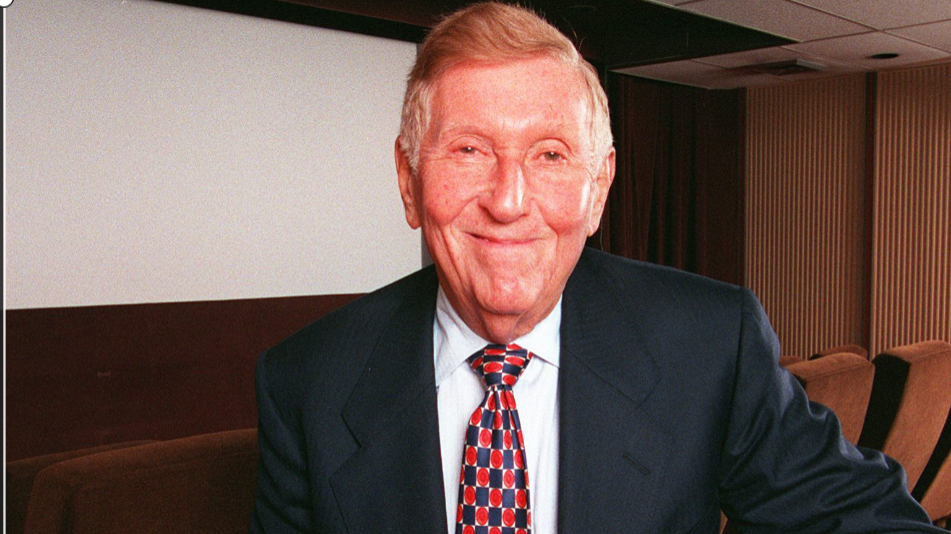Sumner Redstone, Who Built Viacom, Dead at 97
Media mogul acquired CBS

The smarter way to stay on top of broadcasting and cable industry. Sign up below
You are now subscribed
Your newsletter sign-up was successful
Sumner Redstone, the cantankerous media mogul who built Viacom, died Tuesday. He was 97.
Famous for declaring that “content is king,” Redstone’s movie theater company National Amusements bought a controlling interest in Viacom in 1987 and he became executive chairman of the board. He also was CEO from 1996 through 2005.
Viacom became a cable TV giant with networks including Nickelodeon, MTV and Comedy Central, as well as Showtime and the Paramount Studio, While running Viacom, Redstone acquired CBS in 2000. In 2005, he separated the two companies but maintained control of both of them, serving as their executive chairman.
Over the course of his career, he was known for being combative, often starting legal battles with companies and people who cross his path, and dismissing potential successors.
As he became older and more infirm, battles for control of both companies ensued. He resigned his position as chairman of both companies after a court ordered he be examined by doctors.
His daughter Shari Redstone, who had a rocky relationship with her father in terms of her role at the company, eventually prevailed over Philippe Dauman at Viacom and Leslie Moonves at CBS. She also had to prevail over her father’s female companions, who also wanted to control his medical care of the future of his fortune.
After taking control of both companies, Shari Redstone merged them again to form ViacomCBS last year.
The smarter way to stay on top of broadcasting and cable industry. Sign up below
“Sumner Redstone was a brilliant visionary, operator and dealmaker, who single-handedly transformed a family-owned drive-in theater company into a global media portfolio. He was a force of nature and fierce competitor, who leaves behind a profound legacy in both business and philanthropy,” said ViacomCBS CEO Bob Bakish. “ViacomCBS will remember Sumner for his unparalleled passion to win, his endless intellectual curiosity, and his complete dedication to the company. We extend our deepest sympathies to the Redstone family today.”
Redstone was born in Boston, graduated from Harvard and got a law degree from Harvard's law school.
Famously, he suffered severe burns as he survived a fire at the Copley Plaza Hotel in Boston in 1979. His strong will to live led him to declare that he had no intention of ever dying, which was one reason he never came up with a workable succession plan.
What will happen to Redstone’s empire now was not immediately clear.
“With the passing of Sumner Redstone we think little has changed for NAI and VIAC, but that won't stop near-term speculation,” noted analyst Steven Cahall of Wells Fargo. “Mr. Redstone controlled NAI with an 80% stake and through it VIAC via the super class of shares. His daughter Shari is the minority owner of NAI but as his primary caretaker these last years she has represented the totality of NAI in our view. We think her leadership has been regarded as synonymous with his views. His 80% stake now passes to a Trust with seven trustees, including Ms. Redstone.”
Cahall noted that some assets that were Sumner Redstone was particularly attached to--notably the Paramount movie studio--might now be available.
“Many will also wonder whether [Shari Redstone] wants to carry on her father's legacy of ownership and industry consolidation, but we'd say most investors believe her legacy might be one of divestiture or exit,” Cahall said.
“Whether she wants to sell or not is currently of less import than the immediate challenges of navigating a fragmenting media ecosystem to recreate some of ViacomCBS’s lost value,” he added. “We expect that's what CEO Bob Bakish and Ms. Redstone are squarely focused on, though as our Underweight rating suggests, it's not an easy road to navigate.”
Jon has been business editor of Broadcasting+Cable since 2010. He focuses on revenue-generating activities, including advertising and distribution, as well as executive intrigue and merger and acquisition activity. Just about any story is fair game, if a dollar sign can make its way into the article. Before B+C, Jon covered the industry for TVWeek, Cable World, Electronic Media, Advertising Age and The New York Post. A native New Yorker, Jon is hiding in plain sight in the suburbs of Chicago.

